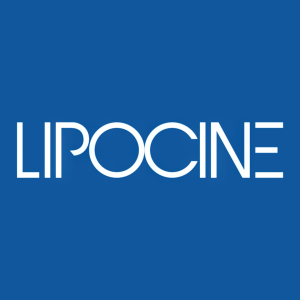Lipocine Announces Positive LPCN 2401 Clinical Results Showing Improved Body Composition in Participants with Obesity
- LPCN 2401 treatment resulted in statistically significant body composition improvement in men
- Increased lean mass (LM) by
4.4% and decreased fat mass (FM) by6.7% - Reduced android fat (AF) by
4.1% and increased bone mineral content (BMC) by2.8%
- Increased lean mass (LM) by
- Well-tolerated, adverse events (AEs) similar to placebo
- Potential for use in combination with incretin mimetics (GLP-1/GIP agonists and/or post GLP-1/GIP agonist) or as a monotherapy post discontinuation
- Conference call and webcast at 8.30 a.m. ET today
"We are pleased with these results demonstrating that LPCN 2401 improves body composition by gaining lean mass and reducing fat mass," said Dr. Mahesh Patel, President and CEO of Lipocine Inc. "As an adjunct therapy to GLP-1/GIP agonists, we believe LPCN 2401 may improve muscle mass, quality, and functionality while maintaining weight loss and amplifying fat loss. Furthermore LPCN 2401 could help to attenuate collateral fattening and rebound fat/weight "overshoot" associated with discontinuation of GLP-1/GIP agonists. We look forward to meeting with the FDA to discuss the further development of LPCN 2401 as an aid to weight management interventions."
This multi-center prospective, blinded Phase 2 study included participants with obesity (BMI ≥30) and participants with BMI ≥27 with at least one weight-related comorbidity (e.g. hypertension, type 2 diabetes, dyslipidemia), a population consistent with FDA guidance for developing products for weight management. Participants were randomized to receive one of three treatments for 36 weeks: A) testosterone ester monotherapy capsule, B) T ester + α-tocopherol capsule (LPCN 2401), or C) matching placebo. Participants underwent Dual-Energy X-Ray Absorptiometry (DEXA) scans to measure body composition at baseline and Weeks 20 and 36. Safety and tolerability were monitored throughout the 36 weeks. Analyses of body composition parameters, including prespecified endpoints of whole body LM and whole-body FM, are reported in the table below.
Results
Among treatments B and C, 27 participants were randomized and completed the baseline and at least one post-baseline DEXA. At baseline, mean BMI was 36.0 kg/m2 and mean age was 52.4 yrs. LPCN 2401 intervention resulted in significant FM lost and LM gained compared to placebo; a significant improvement was noted as early as Week 20. A significant reduction in AF (fat in the area roughly between the pelvis and ribs) and a significant increase in BMC were observed in treatment B, the LPCN 2401 intervention arm. The intervention was observed to be weight neutral, with fat lost offset by lean mass gained. An overall improvement in body composition is evidenced by substantial decrease in the fat mass to lean mass ratio.
Table: Mean Changes in Body Composition with LPCN 2401
LPCN 2401 N= 13 | Placebo N = 14 | LPCN 2401-Placebo (P value) | |||
Baseline | Week 36 | Baseline | Week 36 | ||
Fat Mass* | 37.2 | -5.6 | 39.3 | 1.1 | -6.7 (0.02) |
Lean Mass* | 62.8 | 3.9 | 60.7 | -0.5 | 4.4 (0.02) |
Android ** | 11.9 | -3.5 | 11.2 | 0.7 | -4.1 (0.04) |
BMC (kg) | 3.1 | 1.3 | 3.0 | -1.6 | 2.8 (0.01) |
FM : LM Ratio | 0.60 | -8.6 | 0.66 | 2.0 | -10.6 (0.02) |
* % of total mass; ** % of fat mass; BMC = bone mineral content; FM = fat mass; LM = lean mass, CBL = change from baseline
Analyses set includes all randomized participants (ITT) who have baseline DEXA data and at least one post-baseline DEXA scan. Data are arithmetic means, last observation carried forward (LOCF).
LPCN 2401 resulted in numerically greater fat mass loss than Treatment A (monotherapy). Numerical trends towards improvement in blood pressure and HbA1c with LPCN 2401 support the benefit of Treatment B relative to both placebo and Treatment A. LPCN 2401 was well-tolerated with the frequency and severity of observed treatment-emergent AEs comparable to placebo. No GI or muscle spasm adverse events were reported by participants receiving LPCN 2401.
Dr. Jaime Almandoz, MD, Medical Director of the Weight Wellness Program, and an Associate Professor of Internal Medicine at UT Southwestern Medical Center, added "Treatment with LPCN 2401 resulted in loss of fat mass and significant gains in lean mass in men with obesity. Although the reductions in total body weight were modest, this is very exciting as many popular interventions for treating obesity lead to reductions in lean mass, which can result in negative clinical outcomes."
Dr. Frank Greenway, MD, Professor, and Medical Director of the Pennington Biomedical Research Center of the LSU System and recipient of the Distinguished Leader Award from the American Board of Obesity Medicine in 2018 stated, "The medical risk of obesity is associated with excess fat tissue. Men with obesity distribute their excess fat primarily in the abdominal area which is associated with a greater risk of cardiovascular disease. Despite this greater medical risk, men are under-represented in trials of medications to treat obesity. On the strength of these data, LPCN 2401 has the potential to fill an unmet medical need in men by reducing body fat, increasing lean mass and increasing bone mass to achieve a healthier composition of the body. As expected, this change in body composition is associated with healthier blood pressure and healthier blood sugar measurements."
Recently approved, incretin mimetics (e.g. semaglutide, Wegovy®, tirzepatide, Zepbound®) are widely used in chronic weight management. However, the rapid weight loss observed with these medications includes a substantial proportion of lean mass loss, ~25
About Chronic Obesity Management and Unmet Need
Approximately
The rapid weight loss observed with the approved weight management medications includes unwanted LM loss, up to
Several recent studies showed that body composition, especially lean body mass (muscle) may play an independent role in survival of patients with diseases such as cancer and cardiovascular diseases (DH Lee and EL Giovannucci, Exp Biol Med. 2018). Therefore, a focus on body composition in obesity management to sustainably lose FM while maintaining LM should be an essential goal.
There is a significant unmet need for an oral, efficacious, muscle preserving/gaining option for chronic obesity/weight management that ameliorates the loss of LM associated with GLP-1/GIP agonist treatment, resulting in a higher quality weight loss. Moreover, there is a need for a chronic long-term pharmacotherapy option to maintain weight upon cessation of incretin mimetic therapy, prevent fat/weight rebound "overshoot" and minimize lag in muscle recovery to prevent collateral fattening.
About LPCN 2401
LPCN 2401 is an oral formulation of a proprietary combination of anabolic androgen receptor agonist and α-alpha tocopherol, an antioxidant metabolic modifier. Data from preclinical and clinical studies support the potential of LPCN 2401 in gaining lean mass while losing fat mass. As adjunct therapy to incretin mimetics, LPCN 2401 has potential to attenuate weight rebound, ameliorate loss of muscle mass, improve muscle quality and functionality, amplify fat mass loss with improved body composition, and potential to maintain weight, prevent "fat overshoot," and accelerate muscle rebound post incretin mimetic discontinuation.
Conference Call and Webcast
Lipocine management will host a conference call and webcast with slides beginning at 8:30 a.m. Eastern Time today to discuss the Phase 2 clinical study results and answer questions. To participate via telephone, please dial 1-877-451-6152 or 1-201-389-0879 (ex-
Participants can also click the Call me™ link, https://callme.viavid.com/viavid/?callme=true&passcode=13738729&h=true&info=company&r=true&B=6 for instant telephone access to the event. The Call me™ link will be made active 15 minutes prior to scheduled start time.
The webcast is available to view here and also at www.lipocine.com. It will be available for replay for 180 days.
About Lipocine
Lipocine is a biopharmaceutical company leveraging its proprietary technology platform to augment therapeutics through effective oral delivery to develop differentiated products for CNS disorders. Lipocine has drug candidates in development as well as drug candidates for which we are exploring partnerships. Our drug candidates represent enablement of differentiated, patient friendly oral delivery options for favorable benefit to risk profile which target large addressable markets with significant unmet medical needs.
Lipocine's clinical development candidates include: LPCN 1154, oral brexanolone, for the potential treatment of postpartum depression, LPCN 2101 for the potential treatment of epilepsy, LPCN 2203 an oral candidate targeted for the management of essential tremor, LPCN 2401 an oral proprietary combination of anabolic androgen receptor agonist and α-tocopherol, an antioxidant, as an adjunct therapy to incretin mimetics, as an aid for improved body composition in chronic weight management and LPCN 1148, a novel androgen receptor agonist prodrug for oral administration targeted for the management of symptoms associated with liver cirrhosis including prevention of the recurrence of overt hepatic encephalopathy. Lipocine is exploring partnering opportunities for LPCN 1107, our candidate for prevention of preterm birth, LPCN 1154, for rapid relief of postpartum depression, LPCN 1148, for the management of decompensated cirrhosis, and LPCN 1144, our candidate for treatment of non-cirrhotic NASH. TLANDO, a novel oral prodrug of testosterone containing testosterone undecanoate developed by Lipocine, is approved by the FDA for conditions associated with a deficiency of endogenous testosterone, also known as hypogonadism, in adult males. For more information, please visit www.lipocine.com.
Forward-Looking Statements
This release contains "forward-looking statements" that are made pursuant to the safe harbor provisions of the Private Securities Litigation Reform Act of 1995 and include statements that are not historical facts regarding the development and commercialization of LPCN 2401 and the potential uses and benefits of LPCN 2401 for the improvement of body composition in obesity management. This release also contains statements regarding the potential uses and benefits of our other product candidates. Investors are cautioned that all such forward-looking statements involve risks and uncertainties, including, without limitation, the risks that we may not be successful in developing product candidates to treat obesity disorders, we may not have sufficient capital to complete the development processes for our product candidates, we may not be able to enter into partnerships or other strategic relationships to monetize our non-core assets, the FDA will not approve any of our products, risks related to our products, expected product benefits not being realized, clinical and regulatory expectations and plans not being realized, new regulatory developments and requirements, risks related to the FDA approval process including the receipt of regulatory approvals and our ability to utilize a streamlined approval pathway for LPCN 1154, the results and timing of clinical trials, patient acceptance of Lipocine's products, the manufacturing and commercialization of Lipocine's products, and other risks detailed in Lipocine's filings with the SEC, including, without limitation, its Form 10-K and other reports on Forms 8-K and 10-Q, all of which can be obtained on the SEC website at www.sec.gov. Lipocine assumes no obligation to update or revise publicly any forward-looking statements contained in this release, except as required by law.
![]() View original content to download multimedia:https://www.prnewswire.com/news-releases/lipocine-announces-positive-lpcn-2401-clinical-results-showing-improved-body-composition-in-participants-with-obesity-302114311.html
View original content to download multimedia:https://www.prnewswire.com/news-releases/lipocine-announces-positive-lpcn-2401-clinical-results-showing-improved-body-composition-in-participants-with-obesity-302114311.html
SOURCE Lipocine Inc.







